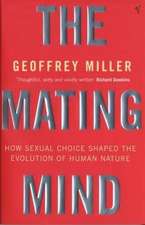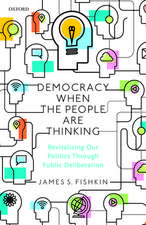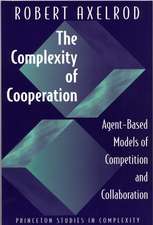The Evolution of Cooperation: Revised Edition
Autor Robert Axelroden Limba Engleză Paperback – 4 dec 2006
The Evolution of Cooperation provides valuable insights into the age-old question of whether unforced cooperation is ever possible. Widely praised and much-discussed, this classic book explores how cooperation can emerge in a world of self-seeking egoists-whether superpowers, businesses, or individuals-when there is no central authority to police their actions. The problem of cooperation is central to many different fields. Robert Axelrod recounts the famous computer tournaments in which the "cooperative" program Tit for Tat recorded its stunning victories, explains its application to a broad spectrum of subjects, and suggests how readers can both apply cooperative principles to their own lives and teach cooperative principles to others.
Preț: 130.63 lei
Nou
Puncte Express: 196
Preț estimativ în valută:
24.99€ • 26.10$ • 20.64£
24.99€ • 26.10$ • 20.64£
Carte disponibilă
Livrare economică 26 martie-09 aprilie
Preluare comenzi: 021 569.72.76
Specificații
ISBN-13: 9780465005642
ISBN-10: 0465005640
Pagini: 264
Dimensiuni: 135 x 202 x 17 mm
Greutate: 0.27 kg
Ediția:Revised
Editura: BASIC BOOKS
Colecția Basic Books
ISBN-10: 0465005640
Pagini: 264
Dimensiuni: 135 x 202 x 17 mm
Greutate: 0.27 kg
Ediția:Revised
Editura: BASIC BOOKS
Colecția Basic Books
Notă biografică
Robert Axelrod is Professor of Political Science and Public Policy at the University of Michigan. A MacArthur Prize Fellow, he is a leading expert on game theory, artificial intelligence, evolutionary biology, mathematical modeling, and complexity theory. He lives in Ann Arbor, Michigan.
Descriere
The Evolution of Cooperation provides valuable insights into the age-old question of whether unforced cooperation is ever possible. Widely praised and much-discussed, this classic book explores how cooperation can emerge in a world of self-seeking egoists-whether superpowers, businesses, or individuals-when there is no central authority to police their actions. The problem of cooperation is central to many different fields. Robert Axelrod recounts the famous computer tournaments in which the "cooperative" program Tit for Tat recorded its stunning victories, explains its application to a broad spectrum of subjects, and suggests how readers can both apply cooperative principles to their own lives and teach cooperative principles to others.
























